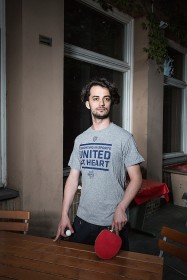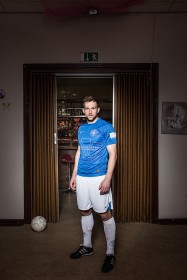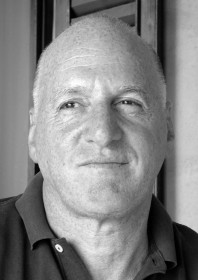The 14th European Maccabi Games (EMG) are taking place in Berlin from 27 July until 5 August 2015. More than 2,000 Jewish athletes from 36 countries will compete in 19 sports from football to fencing to chess. To accompany the games Tamar Lewinsky and Theresia Ziehe are producing a series of portraits with interviews, introducing a new member of the German delegation from Berlin every day here on the blog. They conducted the interviews on the grounds of the TuS Maccabi in Berlin’s Grunewald where Stephan Pramme also shot the portraits.
Alex (25), table tennis

Alex (25), table tennis © Jewish Museum Berlin, photo: Stephan Pramme
Alex, why are you participating in the European Maccabi Games?
The first time I went to a Maccabi training course, I got a little closer to my own identity. I grew up in Goslar, a small town where we were the only Jewish family. That’s why the Maccabi program offered a kind of self-discovery, and I found something like a new family there: there was a lot of Russian spoken, which especially gave me a feeling of home because I can’t travel to Russia anymore. (I have duel citizenship so I could be drafted into military service there.) And of course the competition played a role since I was very achievement-minded at the time.
The EMG are taking place in part at a place heavy with symbolism: the Olympic grounds that were erected for the 1936 games, from which Jewish athletes were barred. Does it have a special significance for you that the EMG are happening in Berlin and in particular at the Olympic stadium? → continue reading
The 14th European Maccabi Games (EMG) are beginning tomorrow, 27 July 2015, in Berlin. More than 2,000 Jewish athletes from 36 countries will compete in 19 sports from football to fencing to chess. To accompany the games Tamar Lewinsky and Theresia Ziehe are producing a series of portraits with interviews, introducing a new member of the German delegation from Berlin every day here on the blog. They conducted the interviews on the grounds of the TuS Maccabi in Berlin’s Grunewald where Stephan Pramme also shot the portraits.
Alec-Ilya Pivalov (28), soccer

Alec-Ilya (28), soccer © Jewish Museum Berlin, photo: Stephan Pramme
Alec, why are you taking part in the European Maccabi Games?
It’s a terrific athletic event where you can meet a lot of interesting people from many different countries. By now there’s also a familial atmosphere in the German delegation so it’s just really nice to have the opportunity to participate. And of course it makes you and your family proud.
In 1936, Jewish athletes weren’t permitted to participate in the Olympic Games. Does the fact that some of the competitive events will take place in Berlin’s Olympic grounds – which were built for that Olympics – play a personal role for you?
There is an ambivalence because of course I know the history of this stadium. But in the meantime I associate it with other events: → continue reading

The author © David Ranan
For his book, “The shadows of the past are still long: Young Jews on their lives in Germany,” culture researcher, David Ranan, conducted interviews with Jews between 20-40 whose grandparents survived the Holocaust and then settled in Germany after the war. The London-based author will present his book at the Academy of the Jewish Museum Berlin on 7 July 2015, as part of the “New German Stories” series. In advance, we asked him three questions.
Julia Jürgens: Mr. Ranan, one question you asked your interviewees deals with the “packed luggage” the first and second generation seem to have at the ready, an expression of their inner conflict between being able to safely stay or having to again flee. Is there still this conflict within the third generation or how else would you describe its sense of belonging to Germany? → continue reading


